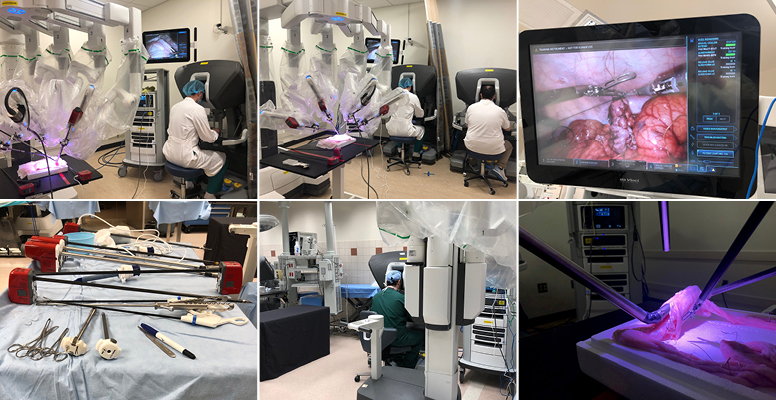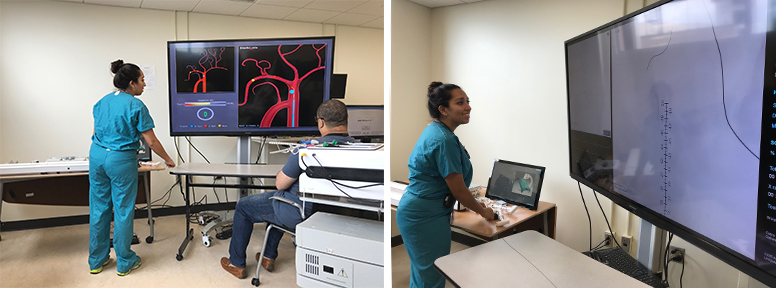Surgical Skills Training is an integral part of the resident experience at Duke University.
This training is conducted weekly, and residents follow the ACS/APDS-endorsed skills curriculum. The training provides residents with extensive opportunities to hone their skills outside of the operating room
Residents of all years are required to participate in surgical skills training, and all residents must complete the Fundamentals of Laparoscopic Surgery (FLS) certification before graduating to a senior resident. The Surgical Education and Activities Lab is a certified SAGES FLS Test Center. Learn more about our Skills Training Curriculum.
Fundamental Laparoscopic Skills (FLS)
The FLS Program consists of:
- FLS Didactic Curriculum (five modules, web-based)
- Hands-on manual skills tasks using the FLS Trainer Box
- Two-part (skills and written) FLS exam to measure your cognitive and technical skills
- This exam is typically required to be completed by Duke Residents before the end of PGY1.
Fundamental Endoscopic Skills (FES)
The FES Program is comprised of an interactive, web-based, multimedia-enhanced didactic curriculum component and a two-part validated assessment made up of:
- A web-based multiple choice exam for evaluating cognitive knowledge
- A virtual reality platform to evaluate fundamental technical and psychomotor skills
- This exam is typically required to be completed by Duke Residents during or soon after the completion of their Endoscopy Rotation during PGY2.
Structured Robot Curriculum
The Duke General Surgery Robotics Curriculum covers all aspects of robotic surgery including simulation, lab training, and operating room assessments. Our goal is to ensure our graduating residents are competent certified robotic surgeons. The requirements for our robotic curriculum certification are the following:
- Online modules with certification
- Simulator training using SimNow platform
- In-Service with DaVinci Xi (1st SEAL lab)
- Procedure based SEAL lab training
- Bedside assist cases (10)
- Console cases (30)
Residents have access to four training robots across four training sites. We have two dedicated simulation Xi robot consoles -- one at Duke North (DUH) and one at Duke Raleigh. We have simulation backpacks for training in the Duke Regional operating rooms and Durham VA operating rooms.
Interns start robot training by completing the online modules and simulation exercises and procedures on the SimNow platform. There are approximately 10 SimNow modules to demonstrate proficiency in basic robot/console knowledge and robotic skills. Intern and junior residents are also expected to complete 10 bedside assist cases in the operating room. Although junior residents are expected to complete online and SimNow modules by the end of PGY-2 year, practice through simulation is encouraged at every level. We currently host a highly competitive "module of the month" between residents and attendings, prizes include a little bit of money and a whole lot of bragging rights.
During PGY-2 and research years, there are multiple hands-on skills sessions using the Xi robot on models and animal tissue. The highlight of the training is small group, procedure-based sessions using Xi platforms on pig models. These sessions start with a structured didactic session about procedure and each resident performs the operation on a pig model with direct attending instruction. This training facilitates the ability of the residents to use the robot in the OR and gain proficiency in bedside and console cases. The program has dedicated support from high volume robotic surgery faculty across all campuses.
Lastly, mid-level to senior residents are expected to complete 30 robotic cases at the console as operating surgeon to graduate the Duke Surgery Robotic Curriculum Certification Program.

Structured Training for Endovascular Techniques (STENT)
The Duke University Department of Surgery is excited to be the first training program in the country to offer a structured, competency-based endovascular skills curriculum to our various surgical trainees along with multi-disciplinary collaboration with general surgery, cardiothoracic surgery, cardiology, and interventional radiology. Learn more about the STENT program.

Skills Training Facilities
Training is conducted in state-of-the-art, on-campus facilities, including: